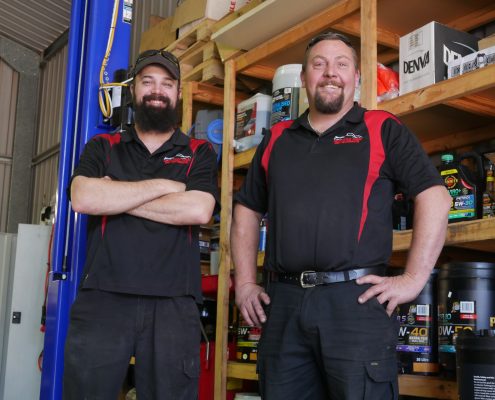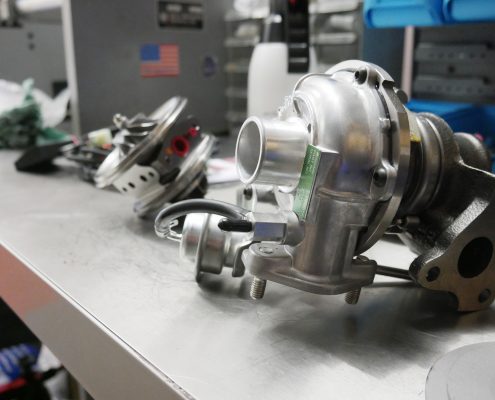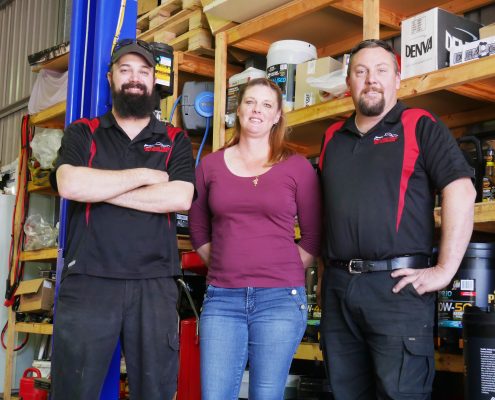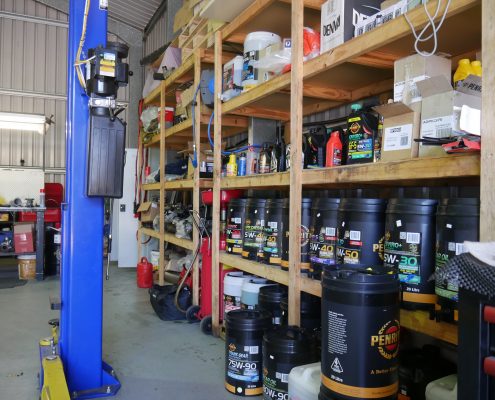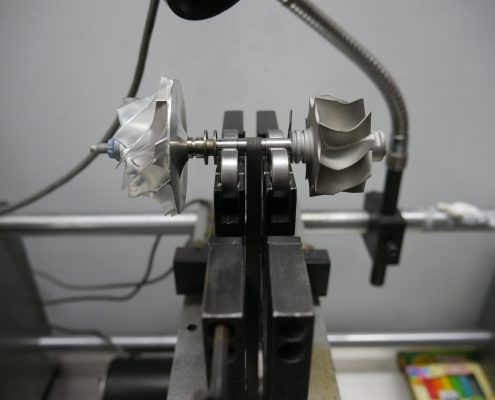MTA Q&A with Motovated Turbo and Mechanical in Toowoomba
Tony Martin and John Di Mauro own and run Motovated Turbo and Mechanical in Toowoomba. The duo established the company in October 2017 and the small business of just three employees has got off to a flying start making a strong impression in the performance and general servicing market under the guidance of its enthusiastic owners.
What products and services does Motovated Turbo & Mechanical provide?
JDM: While turbocharging is our specialty, we also do everything from a basic oil and filter change to changing a bulb to general servicing to pretty much building a car! We have the ability to do all those things and everything in-between. However, we do specialise in turbocharging and diesel diagnostic, repairs and sales.
That’s our primary focus.
TM: There is definitely a market out there for the turbocharging service. It is a specialist skill and there aren’t many people out there who, for instance, repair turbos – there’s a lot of specialist equipment and training involved.
And being that we can do on-vehicle work as well as turbocharging work means we do have an advantage. For example, when we’re dealing with other workshops that are having problems with a turbocharger, we can look at the entirety of the problem. A lot of turbocharger faults can actually be put down to another fault in the car – whether it be poor servicing, a blocked air filter, that sort of thing – and a lot of times turbos will just get replaced even though there’s actually no problem with them and the fault lies elsewhere. We can diagnose where the real problem lies.
JDM: There are also a lot of turbocharger suppliers and sales guys that don’t do on-vehicle stuff and are just the point of sale.
They sell the parts but can’t really tell you what you need to do from that point. That is something we are good at. For instance, we can have a conversation about how one vehicle might usually use a particular turbo but if more power is required, then it might be better to adapt a different turbo and make a few other changes too. That knowledge is where we have it over a lot of others.
The technology is continually changing, so you have to keep up through research and through training courses. You have to invest in yourself and keep evolving too. The most important tool you have is your knowledge. It is a key part.
Performance is a big part of what you do at Motovated. Can you tell me about the Rapid Performance Modules that you market?
TM: Rapid Performance Modules is a brand from Italian company Dimsport and they are designed for computer-controlled diesels and petrol engines.
The module enhances the performance of the vehicle and it does that by making alterations to the fuel injection system or through the boost sensors, depending on the style of module and the type of vehicle. It’s similar to remapping. Remapping rewrites the factory ECU and a performance module does a similar thing but does it externally and is connected directly onto the injectors or the ECU.
The advantage with a module is that you can remove it and the vehicle will then go back to standard. That makes the diagnostic process much easier for any workshop because if the vehicle turns up with a problem it is quite easy to remove.
Another advantage is to the customer. If they have a module on, for example, a HiLux, and after a couple of years they trade in that vehicle for another HiLux, there’s a fair chance that they can take that module off and put it on to the next one. With a remapping, once it’s done, that’s it, it stays in that particular car.
The modules are quite popular and power gains are very similar to remapping. They are simple to install, taking from 15 minutes to an hour, and in that time you’re likely to gain anywhere from 18 – 25 per cent in power and torque, while economy and driveability are also much improved.
I’ve been dealing with Dimsport for the 15 years, since they first came to Australia, have trained with them at their factory in Italy and I bring the modules in directly from overseas and distribute them to the end-user as well as to trade customers.
What’s your background in the industry?
TM: I’ve been in the turbocharger game for the last 17 years. Before that I was doing heavy plant maintenance but got out of that because it was getting a bit hard on the body! I moved into the automotive game and started working on turbochargers – building them, doing overhauls and custom modifications.
I did a lot of formal training in the navy and my original trade is diesel fitting, but I went through the recognition of prior learning process about eight years ago.
JDM: I’ve been in the industry in one way or another for most of my life! I’m originally from Ayr and my grandad owned one of the biggest wrecking yards in north Queensland so I spent my childhood knocking around cars.
I did work as a concreter for a while but then took my first proper step into the industry as a detailer at a Toyota dealership when I was 22. I then went on to do work such as plastic welding and repairs, doing vinyl trims, dashes and so on, and a lot of customising stuff. I also did a lot of car building and customising.
The reason I got in to doing a lot of things myself was because I used to take stuff to workshops and they either wouldn’t do it how I wanted it or wouldn’t do it successfully. I soon realised that I could just cut out the middle man, teach myself and do the work myself.
I was into turbo cars and I used to deal with Tony quite a lot getting various bits and pieces for my cars from the business he used to work at. We built up a friendship and he saw that I was quite savvy and interested in turbos and he offered me a position with them. That job was supposed to be a sales role, but I ended up going into the workshop. That was about seven years ago and that’s how things really got started for me. I didn’t have any formal training but have since done my trade recognition and am qualified as a light vehicle mechanic.
How did you come to establish Motovated?
TM: John and I were working together at another business and had been thinking about it for a while, but we didn’t really know how to take the leap or what was going to be involved. We were doing a lot of research and then circumstances changed at the company we were working at and we thought, ‘Well, let’s go!’.
JDM: We didn’t want to work for anyone else. We had talked about it, thought about it, and decided to give it a crack. We’d never know unless we gave it a try.
TM: The biggest fear was about security. When you are working for a big corporation, you can be confident you are going to be paid every week, but when you go out on your own there is the concern that if you don’t get the work, you won’t get paid. And it takes a lot of effort to make sure that work is coming through the door, that jobs are getting out, that customers are happy and so on.
To reach potential customers we use Facebook and Instagram, and use Local Search too, which works well. We also have a good online presence with our website, and word of mouth is important too, of course.
JDM: There are all the sort of things that you must consider when you run a small business. In a big corporation, there are marketing people, while in a small business the person that is trying to run the business also has to do the social media work, as well as stock ordering and other things too. A small operation has to cover all the angles.
How many staff do you have?
JDM: There’s the two of us plus Natasha who does our admin, our books, helps us to order parts, invoicing . . . she actually does a bit of everything!
It’s been less than a year since you established the business. Are you pleased with how these first few months have gone?
JDM: It has gone really well. We were talking only recently about how we had set all these goals for the first 12 months and we’ve smashed pretty much all of them in the first six!
To what do you attribute this brilliant start?
TM: I think part of it is that, as a small business, we can offer a more personalised service. Our customers get to talk directly to us – the people doing the work. At other shops they may not talk to the technician who actually does the job.
JDM: We can work with the customer right through the process. I might talk to a customer initially via Facebook and I’ll be there all the way through to bringing them into the workshop, diagnosing what is wrong with their vehicle, fixing it and sending them on their way happy.
Where do you hope to take the business in the next few years?
TM: I’d like to see the business grow, maybe to five staff or so. For a start, that would mean a less pressure on John and I and would allow us to take a break! I wouldn’t want to see it go massively big because then you lose that personal service, and I think that personal service is key.
What do you do with your spare time?
TM: My son races motocross so I’m forever working on his bike! He’s an apprentice carpenter and has a HiLux that were working on together to rebuild the motor.
JDM: Work on cars! I used to have an old HQ ute with an LS engine in it, and that car actually ended becoming a bit famous.
I wanted to create a rusty old ute that had a killer driveline and was mint mechanically and inside. We started its own Facebook page and it has reached about 18,000 followers! I still have it but have sold the driveline as I’m currently building a hatchback Torana and I need a lot of money for that!
Source: Motor Trader Aug Edition
14 Aug 2018




